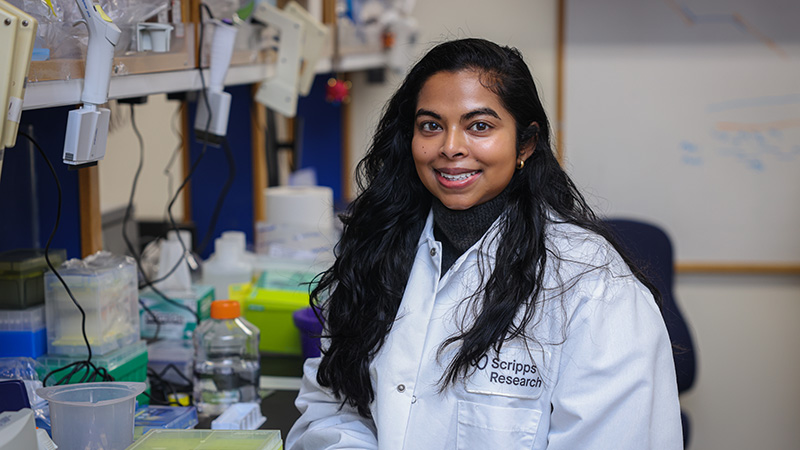Emerging infectious diseases pose a persistent global health threat, with the potential to cause widespread morbidity, mortality, and significant social and economic disruptions. Postdoctoral researcher Jyothi Purushotham is working to understand how pathogens interact with their hosts, which is essential for deciphering the mechanisms that drive infection, transmission, disease progression and pathogen evolution. These insights can guide the development of preventive and therapeutic strategies to mitigate the impact of emerging pathogens on human populations.
What is your research focus?
As a postdoctoral researcher in Kristian Andersen’s lab, I investigate the dynamics between viruses and the human immune system and how these interactions influence the trajectory of disease. My work focuses on uncovering the factors that trigger dysfunction or dysregulation within the adaptive immune response to infection (i.e., antibody, B cell and T cell responses). Such disruptions can result in ineffective viral clearance, rampant inflammation, irreversible tissue damage and more severe disease.
Currently, I am studying these processes in the context of COVID-19 and Lassa fever, conducting longitudinal observational studies in patient cohorts in the United States and abroad. By deeply profiling immune responses over the course of acute infection and recovery, I aim to identify immunological markers that correlate with disease severity and outcomes, including survival or the occurrence of chronic sequelae. Ultimately, by determining which components of the immune response modulate disease progression, my research seeks to inform the development of targeted therapies that enhance clinical care and support long-term recovery for patients.
Is there a project that you are currently working on that you are particularly excited about?
I am particularly excited about my current project investigating the immunological factors that drive acute disease outcomes and long-term sequelae in Lassa fever patients. This study, conducted in Nigeria, is a collaboration with Professor Christian Happi at the African Center of Excellence for Genomics of Infectious Diseases (ACEGID) and three Lassa fever treatment centers: Alex Ekwueme Federal University Teaching Hospital Abakaliki, Federal Medical Centre Owo and Irrua Specialist Teaching Hospital. I feel deeply privileged to work with an exceptional team of partners in Nigeria, whose dedication on the ground has been instrumental in bringing this study to launch.
After nearly two years of preparation, I am thrilled that we are now actively enrolling patients and collecting samples. As the first multi-site clinical study that I have led, this project has been an incredible learning experience for me, providing valuable insights into leadership and project management—though it has certainly come with its challenges. I hope that the project continues to progress as planned and that we obtain results with the potential to inform the development of more targeted treatments for Lassa fever patients.
What made you want to pursue your postdoctoral research at Scripps Research?
I chose Scripps Research because of its reputation as a top-tier research institution with a history of pioneering work in viral immunology. The Andersen lab stood out as an ideal fit to build upon my doctoral research focusing on emerging viral pathogens while gaining expertise in computational immunology—an entirely new skill set for me.
The lab’s strong focus on ethical and equitable global health research, particularly through its close partnerships with international institutions and commitment to capacity building, deeply resonated with my values and career goals. Additionally, the opportunity to train as a scholar in the Scripps Research Translational Institute’s K Scholars Program, where I could engage in impactful translational research and learn from leaders in digital medicine like Eric Topol, was another major factor in my decision. Together, these opportunities make Scripps Research an exceptional environment for advancing my scientific and professional growth.
What does Diversity, Equity, and Inclusion mean to you?
To me, Diversity, Equity, and Inclusion (DEI) in biomedical research means creating a scientific community and framework that are representative, equitable and inclusive of diverse voices and experiences. DEI is vital among researchers and the populations we serve, as it reinforces ethical and impactful science. Diverse perspectives drive innovation and strengthen our ability to address complex health challenges. However, equally important is the inclusion of underrepresented groups in research. Historically, biomedical studies have often excluded minority populations, leading to gaps in understanding their unique health needs. Advancing DEI ensures that scientific breakthroughs and health policies benefit all communities, especially those disproportionately affected by health disparities.
As a postdoc in the global health field, I actively contribute to DEI through mentorship and research systems-strengthening initiatives. Locally, I’ve mentored students in the SRTI Summer Research Internship Program and served on the organizing committee for Scripps Research’s Summer Program Application Mentorship (SPAM) program. These initiatives focus on guiding motivated students, particularly those with limited access to research opportunities or from underrepresented backgrounds. I strive to build lasting relationships with my mentees, supporting their academic and professional growth over time.
A core component of my Lassa fever research has been strengthening the skills and capacity of our collaborating research teams in West Africa. Through in-person visits and virtual training sessions, I have had the privilege of working with dedicated trainees and aspiring scientists committed to combating infectious diseases and advancing global health. I am particularly inspired by the ambitious and talented young women I have been advising. Supporting their future planning—whether through guidance on graduate school applications or exploring career opportunities—has been an especially rewarding aspect of this work.
As I advance in my career, I remain committed to fostering DEI through my own work and by advocating for institutional initiatives that prioritize inclusivity, representation, and equity.
Original post: Scripps Research Magazine – Community Corner: A Q&A with global health researcher Jyothi Purushotham


